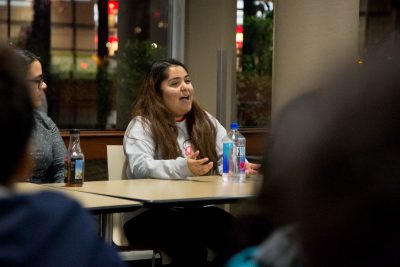
Alianza Latina Boston University and Active Minds at BU hosted a mental health panel called “No Estamos Locos: Destigmatizing Mental Health in Minority Communities” Tuesday night in the George Sherman Union.
The discussion focused on mental health in Latino communities with nearly 50 people in attendance.
“We’re hosting this event with Active Minds to address mental health stigma on college campuses, more specifically how it affects minority students,” said Camila Romero, a junior in the College of Arts and Sciences and the Allianza Latina public relations chair.
The four panelists talked about how seeking help for mental health issues is sometimes seen as a sign of weakness. Often cultures, religions and families view and react to these struggles differently, they said.
Geovanna Hernandez, the Boston program manager for Peer Health Exchange, said the aspects of one’s life that cannot be controlled, such as violence in neighborhoods or in classrooms, are factors that have an impact on mental health.
“I don’t think I can translate mental health, even as a word, in Spanish,” said Hernandez, a panelist. “How do we talk about these systems [of oppression] that are invisible to those experiencing them when we don’t have the language to do so?”
Mercedes Cisneros, another panelist, said growing up in a family that brushed off mental health led her to have feelings of denial when she was diagnosed with depression.
The topic of the panel then transitioned toward the stigma of asking for general mental health advice.
Dori Hutchinson, a professor in the Sargent College of Health and Rehabilitation Sciences, said there is a “culture of silence” surrounding mental illness.
“People’s mental health matters, and it’s very linked in the research to academic success, social wellbeing and to our physical health, so we cannot ignore our mental health,” Hutchinson, another speaker, said.
Hutchinson said indicators for college mental health distress include the use of drugs, isolation, emotional volatility and drastic changes in sleep and diet.
She also talked about “the power of we” and how doing things together is a way to feel more comfortable about mental health issues that students may be going through.Hutchinson also the importance of comforting and empathizing with those who may be struggling with mental health.
Several students said the discussion related to issues they have dealt with personally.
Crystal Castro, a sophomore in CAS, said practicing self-care is important for a healthy mind.
“Remembering to take time for yourself and make yourself a priority [is important] because I know everyone says it,” Castro said. “It’s really common to hear, ‘treat yourself,’ but it’s an actual thing, and you should actually take care of yourself and value yourself.”
Joshua Frías, a sophomore in CAS, said that as a man of color, his demographic is particularly neglected.
“[Mental health] is often ignored especially amongst minorities, especially males of color,” Frias said. “There’s always this stigma where you’re not supposed to feel sad or breakdown or constantly be affected mentally.”
Carina Cruz, a senior in Sargent, said that as part of the Latino community, the panelists touched on many topics she has experienced firsthand.
“In the Latino community we don’t really discuss mental health,” Cruz said. “Back in our home countries there’s not really the words to describe mental illness, so it’s important that we do find the way to have this conversation with our friends and families.”




